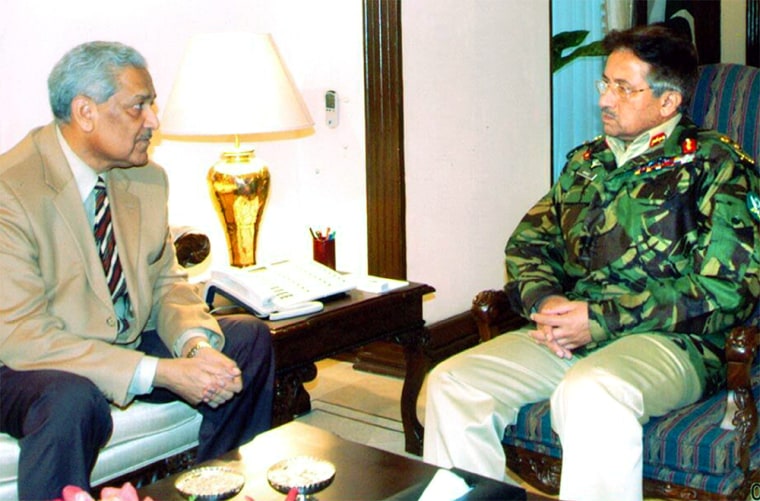Pakistan denied on Monday delivering nuclear technology to North Korea in exchange for missiles, as it sought to deflect accusations of state involvement in proliferation.
Foreign Ministry spokesman Masood Khan also said last week’s pardon by President Gen. Pervez Musharraf for the father of the country’s nuclear program was “conditional,” applying to the acts he’s confessed to so far — but that the investigation continues into Abdul Qadeer Khan and his associates.
“The pardon is specific to the charges made so far, and about which Dr. A.Q. Khan has made a confessional statement,” Masood Khan said. “But this is not a blanket pardon.”
Allegations of Pakistan having spread nuclear technology to North Korea have long focused on a flight of a Pakistani C-130 military cargo aircraft there in July 2002.
Masood Khan acknowledged that flight Monday, but said Pakistan only picked up shoulder-fired anti-aircraft missiles.
‘This is utter nonsense’
“There was no nuclear technology on board, absolutely none,” he said. “This is utter nonsense.”
The United States imposed sanctions on a top Pakistani nuclear facility — Khan Research Laboratories, named after Abdul Qadeer Khan — and a North Korean company, Changg Wang Sinyong Corp., in March 2003 for missile transactions.
At the time, the U.S. Embassy in Pakistan said the lab made “material contributions” to another unspecified country, person or entity’s efforts to “use, acquire, design, develop and/or secure weapons of mass destruction, and/or missiles capable of delivering weapons.”
The Federation of American Scientists has said Pakistan’s Ghauri missile series — capable of carrying a nuclear payload deep into rival India — is a copy of North Korea’s Nodong missile. Pakistan has strongly denied that claim.
Khan admitted last week in a televised confession to sharing secrets, but didn’t name any specific countries.
Pakistani officials told journalists he admitted in a written confession to selling nuclear technology to Iran and Libya for supposed ideological reasons to help other Muslim states develop nuclear weapons and draw attention away from Pakistan. The reasons for his sales to North Korea weren’t clear.
Confession details haven't been divulged
Details of the confession haven’t been publicly released, and Masood Khan declined Monday to reveal the exact charges against Abdul Qadeer Khan.
A local newspaper, The News, reported Sunday that Pakistan was pressured to launch the investigation after top U.S. officials confronted Musharraf in October with evidence detailing Abdul Qadeer Khan’s black market contacts, warning that Islamabad’s relations with Washington and the world would suffer if no action was taken.
U.S. intelligence had documented Khan’s travels to the United Arab Emirates, Malaysia, Libya, Iran and North Korea, and had details of meetings with black market figures, documents and bank account information, according to the report.
U.S. officials also mentioned Khan’s attempts to sell nuclear secrets to Saddam Hussein and a meeting in Lebanon with a top Syrian government official, the newspaper said. Both countries turned down Khan’s help.
Pakistani officials declined to comment on the report.
Musharraf has insisted there was no official involvement in proliferation, and said he won’t allow an independent investigation or any international probe into Pakistan’s nuclear program.
Powell expresses U.S. ‘appreciation’
On Sunday, U.S. Secretary of State Colin Powell expressed his “appreciation” of the investigation of Abdul Qadeer Kahn in a phone call Sunday to Musharraf, said Masood Khan.
Powell has also said he plans to visit the country, an official said.
The United States has declined to publicly criticize Islamabad over the transfer of secret technology by Abdul Qadeer Khan. Instead, Washington has praised the investigation and called Musharraf’s decision last week to pardon Khan after the scientist’s televised apology an internal matter.
Musharraf, who seized power in 1999, is a key U.S. ally in the war on terror, but his alliance with Washington has prompted criticism at home, and Islamic extremists were blamed for two assassination attempts against Musharraf in December.
